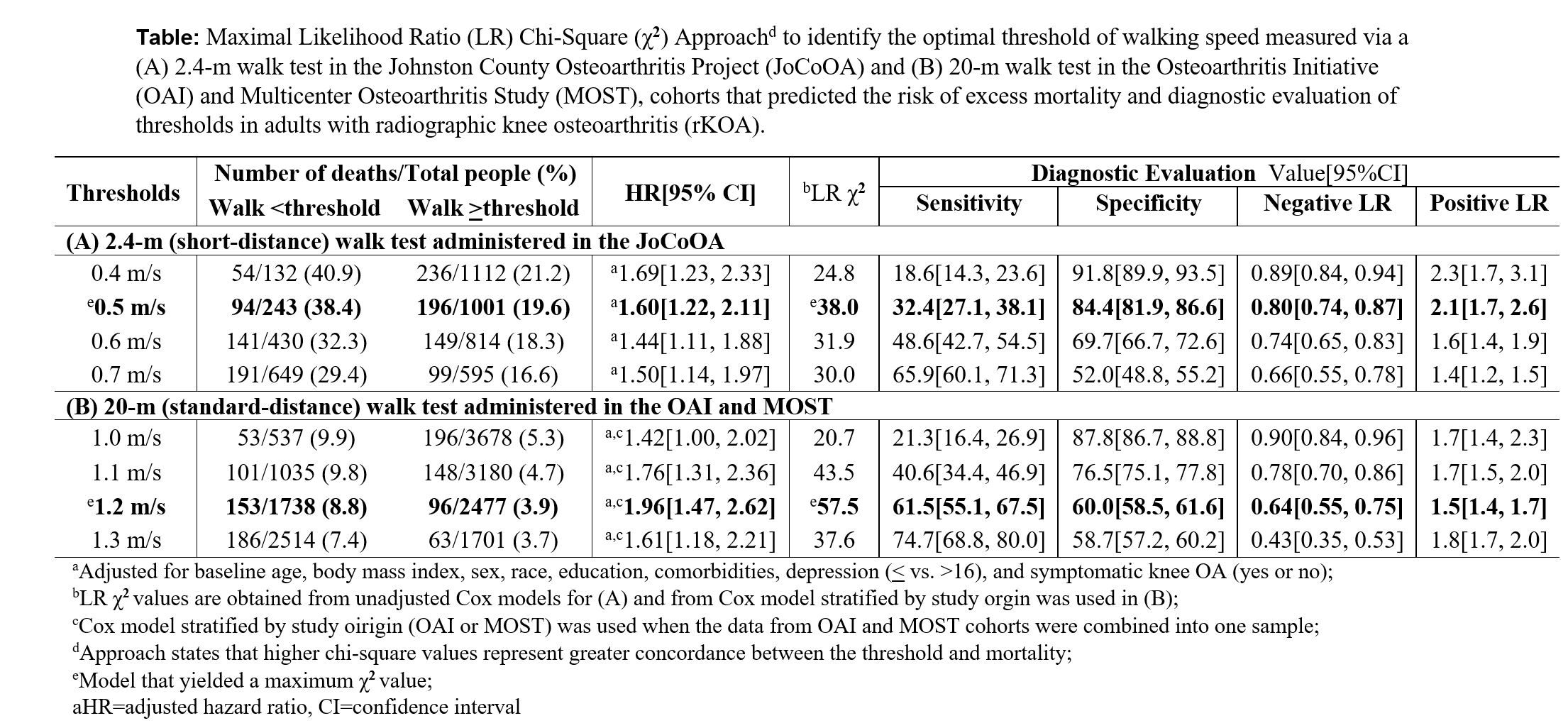Session Information
Date: Sunday, November 8, 2020
Title: Epidemiology & Public Health II: Risk Factors & Outcomes (1467–1471)
Session Type: Abstract Session
Session Time: 4:00PM-4:50PM
Background/Purpose: Patients with radiographic knee OA (rKOA) are at increased risk of mortality and walking difficulty may mediate this relation. Walking speed may be used to objectively assess walking difficulty. However, there is little consensus on the specification for testing distance, which may affect the values of walking speed. Subsequently, this difference may limit the ability to generalize results between different test distances. It is not known if speed measured from short (2.4-meter) and standard (20-meter) distance walk tests similarly predict mortality risk. Therefore, the purpose of the study was to investigate the association of walking speed measured via short and standard distances to mortality risk in adults with rKOA using three large longitudinal cohort studies in the United States.
Methods: We included participants with rKOA (presence of Kellgren Lawrence grade >2 in either knee) from the Johnston County Osteoarthritis Project (JoCoOA) which is longitudinal population-based cohort, Osteoarthritis Initiative (OAI) and Multicenter Osteoarthritis Study (MOST), latter two being cohorts of individuals with or at high risk of knee OA. Walking speed was measured via 2.4-meter walk test (short-distance) in JoCoOA and 20-meter walk test (standard-distance) in OAI and MOST. The data from OAI and MOST were combined because they measured walking speed in a similar fashion. To examine the association of baseline walking speed specific to each test with mortality risk over nine years, hazard ratios (HR) and 95% confidence intervals (CI) were calculated from Cox regression models adjusted for potential confounders. To identify an optimal threshold of walking speed specific to each test that best discriminiated mortality risk, Maximal Likelihood Ratio Chi-square Approach was utilized.
Results: Deaths after 9 years of follow-up occurred in 23.3% (290/1244) of JoCoOA (age [mean±sd] 65.2±10.8 years, BMI 31.9±7.7 kg/m2, 67% female) and 5.9% (249/4215) of OAI and MOST (age 63.1±8.6 years, BMI 30.6±5.6 kg/m2, 59% female). Walking 0.1 meters/second slower during short- and standard-distance walk tests was associated with 11% (HR[95%CI]; 1.11[1.05, 1.18]) and 12% (1.12[1.05, 1.20]) higher risk of mortality, respectively. Walking slower than 0.5 meters/second on short-distance walk test, and slower than 1.2 meters/second on standard-distance walk test, best discriminated those with and without excess mortality risk (Table).
Conclusion: Slower walking speed measured via short- and standard-distance walk tests was associated with increased mortality risk in adults with rKOA. The study findings on optimal thresholds should be viewed with caution because the short- and standard-distance walk tests were administered in different cohorts. However, a plausible expalination for the differences in the optimal thresholds between different walk tests may be due to the variability in test distances, which may affect the acceleration and deceleration walking phases to achieve a self-selected usual pace.
To cite this abstract in AMA style:
Master H, Neogi T, Callahan L, Nelson A, LaValley M, Cleveland R, Golightly Y, Thoma L, Zhang Y, Voinier D, Christiansen M, Jakiela J, Nevitt M, Lewis C, Frey Law L, White D. The Association of Walking Speed from Short- and Standard-Distance Tests with Mortality Risk Among Adults with Radiographic Knee Osteoarthritis: Data from Johnston County Osteoarthritis Project, Osteoarthritis Initiative and Multicenter Osteoarthritis Study [abstract]. Arthritis Rheumatol. 2020; 72 (suppl 10). https://acrabstracts.org/abstract/the-association-of-walking-speed-from-short-and-standard-distance-tests-with-mortality-risk-among-adults-with-radiographic-knee-osteoarthritis-data-from-johnston-county-osteoarthritis-project-osteo/. Accessed .« Back to ACR Convergence 2020
ACR Meeting Abstracts - https://acrabstracts.org/abstract/the-association-of-walking-speed-from-short-and-standard-distance-tests-with-mortality-risk-among-adults-with-radiographic-knee-osteoarthritis-data-from-johnston-county-osteoarthritis-project-osteo/

